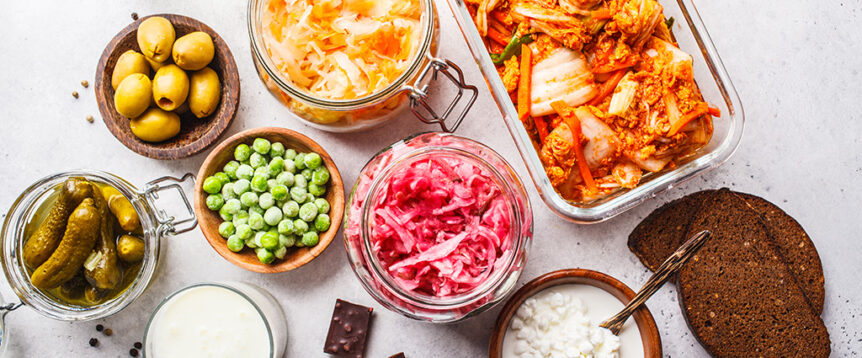Food fermentation is nothing new. In fact, fermentation was one of humankind’s original ways to preserve and enhance food. However, fermented foods have recently re-entered the spotlight along with a growing body of research supporting their benefits.
What are fermented foods?
Fermentation occurs when beneficial microorganisms (e.g., bacteria and fungi including yeasts and molds) grow and transform the properties of food. The end-product determines whether it is classified as a fermented food or a probiotic fermented food. These terms often get misused, though key differences exist.Fermented foods don’t require a document health benefit and may or may not contain live microbes at the time of consumption. For example, foods such as bread, chocolate, soy sauce, and most wines and beers undergo fermentation when produced but do not contain live microorganisms when they’re eaten.
Probiotic fermented foods or foods labelled as containing probiotics, on the other hand, must have a demonstrated health benefit provided by live microorganisms present in the product (e.g., yogurt, kefir).
Health benefits of fermented foods
The health benefits of fermented foods are promising. For starters, fermented foods may have more bioavailable vitamins, prebiotics, enhanced digestibility, and reduced toxins. Some contain active cultures or probiotics. And recent research has revealed the following benefits:
- Microbiome and digestive support
- Beneficial microorganisms in fermented foods can colonize the gut increasing microbiome diversity.
- In addition, foods such as kefir—the most widely studied fermented food—may be better tolerated by people with lactose malabsorption and have beneficial effects for associated gastrointestinal symptoms.
- Anti-inflammatory and immune health
- Certain fermented foods may enhance immune function, reduce frequency and duration of respiratory infections, and have antioxidant and anti-inflammatory properties.
- Reduced risk of chronic diseases and mortality
- Frequent intake of certain fermented foods may be associated with better cardiovascular health and a reduced risk of type 2 diabetes, cancer, and mortality.
Tips to up your intake
Try adding an extra touch of flavor and nutrition to your routines with these simple strategies.
- Add kefir or yogurt to smoothies, granola, cereal, or overnight oats.
- Top mashed potatoes, grain bowls, sandwiches, wraps, salads, soups, stir-fries, or tacos with sauerkraut or kimchi.
- Add grilled tempeh or fermented vegetables to a grain bowl, salad, or wrap.
It has been well documented that our gut microbiomes have suffered from industrialization. One antidote: add more (beneficial) bugs to your life!

